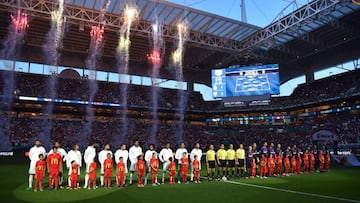Coronavirus: football faces an uncertain future
The crisis currently being seen across the world due to Covid-19 has brought sporting competitions crashing down, and the rebuild may look quite different.

The footballing calendar is facing an unprecedented collapse. The rise of new competitions over the years, all with a view to raising revenue in the industry, has left us in a position where there is precious little available time to fit in the required commitments with the interruption due to coronavirus. This situation has led authorities in the game such as FIFA president Gianni Infantino to open the door to the remodelling of the football season, potentially reducing the number of games. This could lead to a reduction in TV revenue and pit leagues and clubs against each other.
Football: a new approach
“We can perhaps reform world football by taking a step back,” Infantino stated to La Gazzetta dello Sport. “With different formats and less tournaments, but more interesting.
“Maybe fewer teams, but more balanced. Less games, to protect the health of players, but more competitive. It's not science fiction, let's talk about it.
“We quantify the damage and see how we can cover it. We have to make sacrifices.”
This is a totally different approach to the one that has been put forward in recent seasons which has seen more, not less, aimed for. Additions to the regular tournaments such as the World Cup, European Championships, Copa América, and African Cup of Nations, we have seen the likes of the UEFA Nations League and the Club World Cup. Then there are the proposed changes to the format of the UEFA’s competitions: the reformulation of the Champions League (more matches, more TV revenue) and the creation of a third, the Europa Conference League.
Fabio Cannavaro believes it will be difficult for European football to return before the season ends amid the coronavirus pandemic...https://t.co/zXfr7nmeDc
— AS USA (@English_AS) March 25, 2020
With the stoppage to all football at the moment due to the pandemic, focus is switching to other solutions, which could include playoffs to decide titles and relegation, as well as the potential for a Champions League ‘Final Four’ to follow one-legged qualifiers for those that remain. The other idea is to complete the current season for all competitions (which are close to completion) once the sport returns with the impact being felt in the following campaign, possibly shortening it.
By extending into the summer there are obvious and much talked about complications. What happens to players whose contract ends on June 30? FIFA, leagues, federations and footballers unions would have to reach an agreement for such an exceptional situation. What about the pre-season or the statutory ‘break’ that players are entitled to? The knock-on effects would be huge, and the main impact of this would, once again, be loss of revenue.
Footballer health
Related stories
Well, the revenue is one thing, but players’ health must also be considered. Trying to play the same amount of matches in less time would clearly have a physical impact on the athletes, with injuries much more likely. Some people have suggested that squad sizes be allowed to increase but again, this will be easier for some clubs to achieve than others, especially if there is a drop in revenue.
The industry as a whole needs to take steps to find a solution, and it will not be a simple conversation, with confrontations a plenty ahead. This has already been evident with the comments from LaLiga president, Javier Tebas, who pointed to Infantino himself to reduce the number of ‘less important’ international fixtures. How the footballing landscape returns after this crisis remains as uncertain as daily life.
